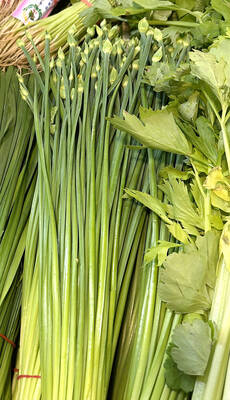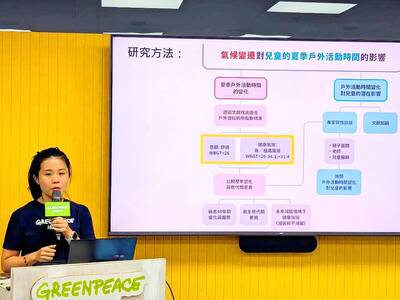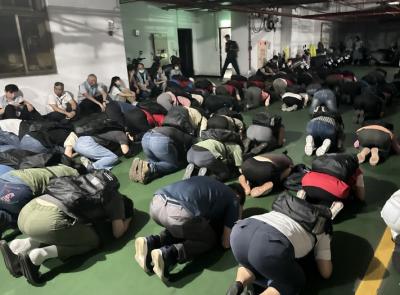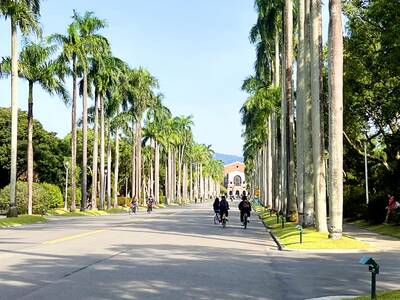A former Chinese acrobat who has been living precariously in Taiwan for nine years with no identification is now officially able to call Taiwan his home after recently receiving his identification card from the government.
Yun Qiaozhen’s (惲喬圳) first visit to Taiwan was 12 years ago, when he arrived on tour with the famous Beijing Acrobatic Troupe of China. During that trip, he met Taiwanese receptionist Lee Shu-chen (李淑貞) and it was love at first sight.
Yun returned to Taiwan three years later to marry Lee, who went ahead with the nuptials even though her family did not bless the union.
Despite Yun’s talents as a performer, however, they lead a difficult life as husband and wife because Yun could not perform publicly without identification.
Their lives became even more miserable when their daughter was born. Yun could only earn small sums performing acrobatics and Sichuanese opera at private gatherings illegally.
“We were so poor that at one point I thought about robbing a bank,” Yun recalled.
Fortunately, they hung on by supporting each other and vowed to face any challenge.
Eventually, as Yun became more well-known, his appointments diary began filling up, which meant more money coming into the home.
“Qiaozhen is a good husband and a good father who works harder than most Taiwanese and with greater perseverance,” said Lee, who now works as Yun’s assistant and travels with him for performances nationwide.
Yun, 37, was born in Beijing into an acrobatic family who had been performing before emperors and empresses dating back to the Qing Dynasty.
“The Yun family performed before the last emperor of the Qing Dynasty, Pu Yi [溥儀], the day before he was expelled from the Forbidden City,” Yun said.
Yun began to learn the craft when he was six years old.
The language barrier was not a problem living in Taiwan, Yun said, although prejudice and misunderstanding against “mainlanders” sometimes made his life more difficult.
“Today, however, I find Taiwan is getting lovelier and lovelier, particularly when I am met with thunderous applause at the end of my shows,” he said.

The Taipei Department of Health’s latest inspection of fresh fruit and vegetables sold in local markets revealed a 25 percent failure rate, with most contraventions involving excessive pesticide residues, while two durians were also found to contain heavy metal cadmium at levels exceeding safety limits. Health Food and Drug Division Director Lin Kuan-chen (林冠蓁) yesterday said the agency routinely conducts inspections of fresh produce sold at traditional markets, supermarkets, hypermarkets, retail outlets and restaurants, testing for pesticide residues and other harmful substances. In its most recent inspection, conducted in May, the department randomly collected 52 samples from various locations, with testing showing

The government should improve children’s outdoor spaces and accelerate carbon reduction programs, as the risk of heat-related injury due to high summer temperatures rises each year, Greenpeace told a news conference yesterday. Greenpeace examined summer temperatures in Taipei, New Taipei City, Taoyuan, Hsinchu City, Taichung, Tainan and Kaohsiung to determine the effects of high temperatures and climate change on children’s outdoor activities, citing data garnered by China Medical University, which defines a wet-bulb globe temperature (WBGT) of 29°C or higher as posing the risk of heat-related injury. According to the Central Weather Administration, WBGT, commonly referred to as the heat index, estimates

Taipei and other northern cities are to host air-raid drills from 1:30pm to 2pm tomorrow as part of urban resilience drills held alongside the Han Kuang exercises, Taiwan’s largest annual military exercises. Taipei, New Taipei City, Keelung, Taoyuan, Yilan County, Hsinchu City and Hsinchu County are to hold the annual Wanan air defense exercise tomorrow, following similar drills held in central and southern Taiwan yesterday and today respectively. The Taipei Mass Rapid Transit (MRT) and Maokong Gondola are to run as usual, although stations and passenger parking lots would have an “entry only, no exit” policy once air raid sirens sound, Taipei

Taipei placed 14th in the Quacquarelli Symonds (QS) Best Student Cities 2026 list, its highest ever, according to results released yesterday. With an overall score of 89.1, the city climbed 12 places from the previous year, surpassing its previous best ranking of 17th in 2019. Taipei is “one of Asia’s leading higher-education hubs,” with strong employer activity scores and students “enjoying their experience of the city and often keen to stay after graduation,” a QS staff writer said. In addition to Taipei, Hsinchu (71st), Tainan (92nd), Taichung (113th) and Taoyuan (130th) also made QS’ list of the top 150 student cities. Hsinchu showed the